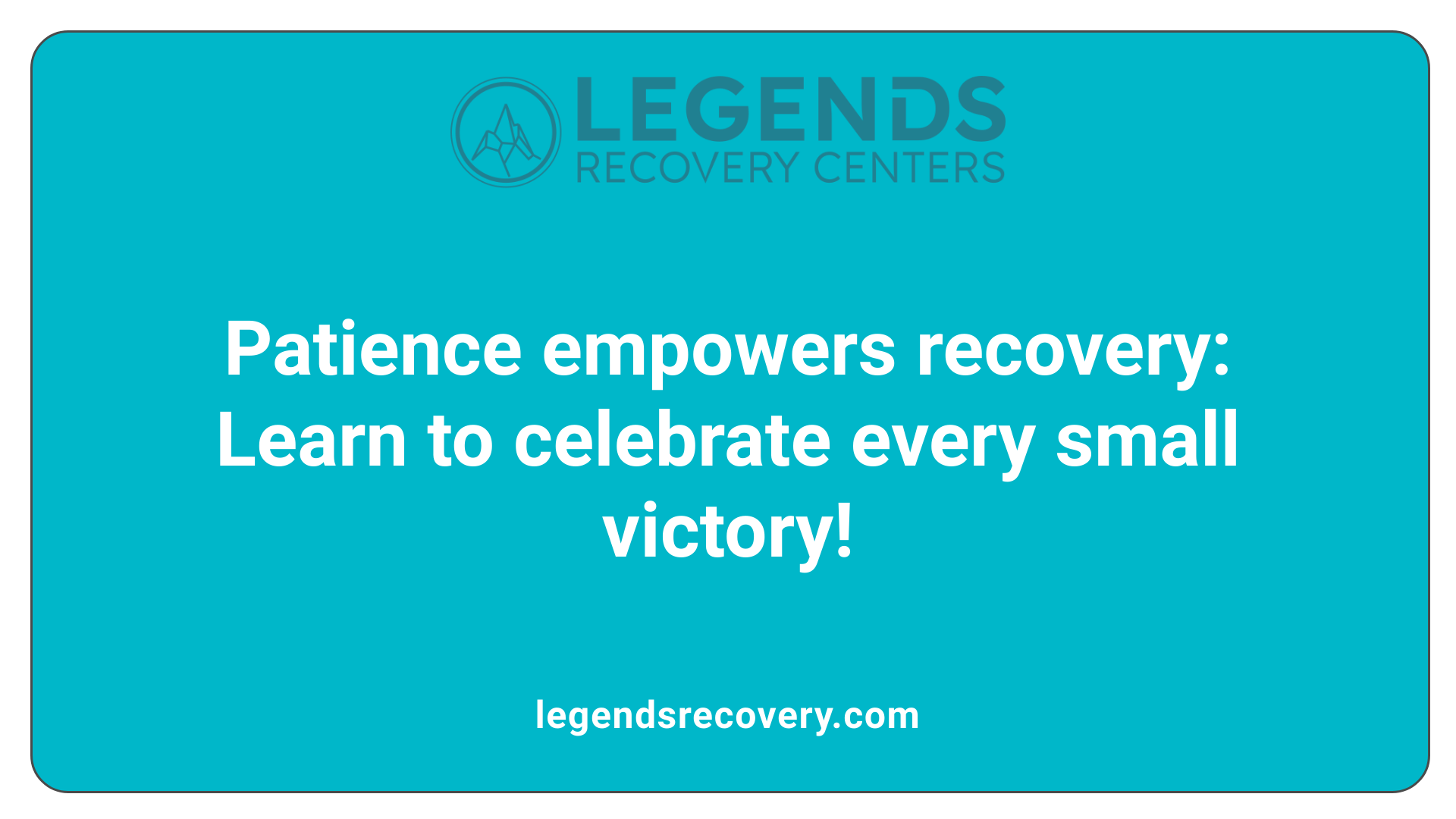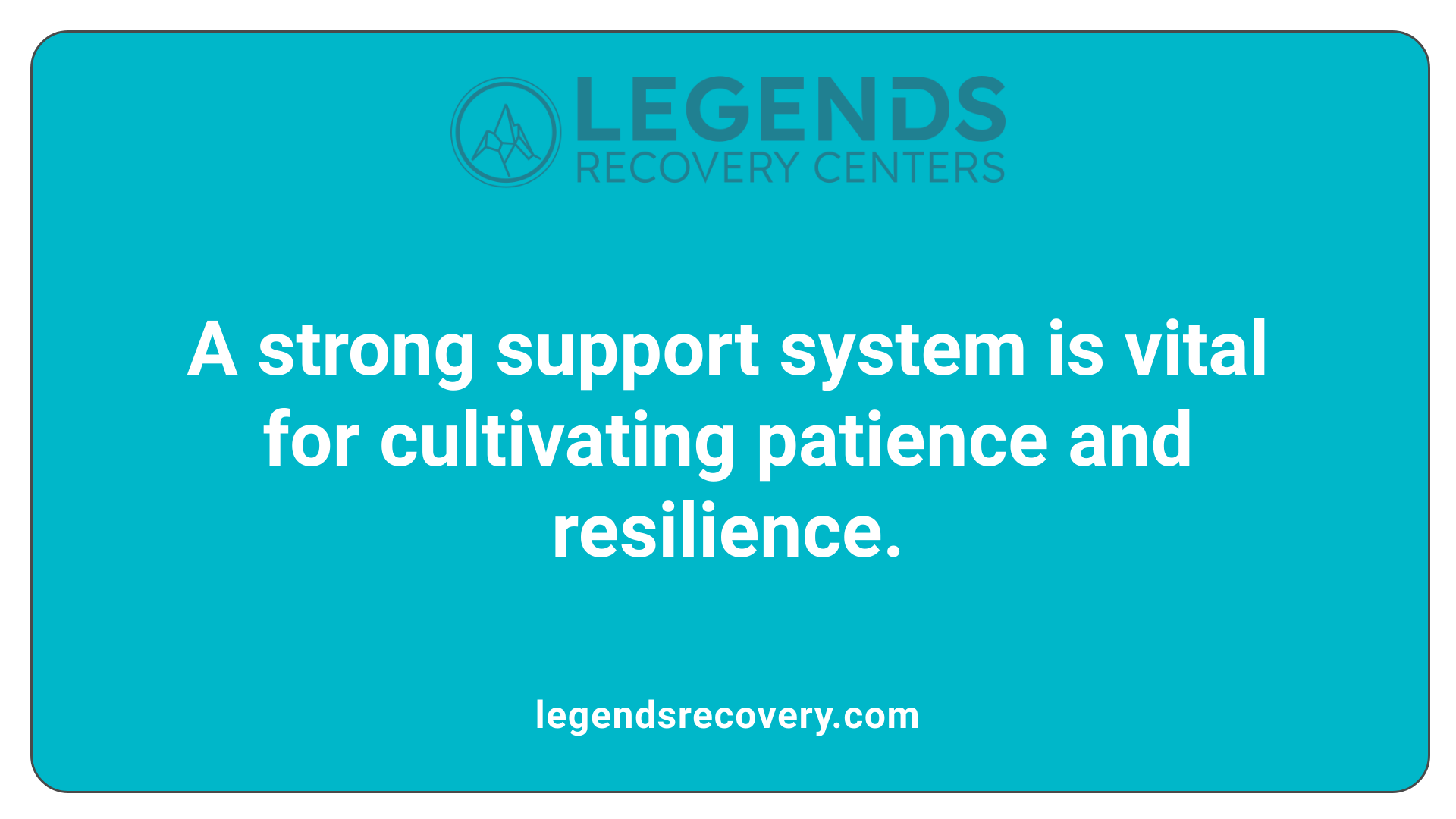Building Strength Through Patience and Perseverance in Recovery

In the challenging journey of addiction recovery, two cardinal virtues stand out as pillars of enduring success: patience and perseverance. These qualities not only influence the pace and sustainability of recovery but also enrich the entire healing journey. By understanding their significance and learning how to cultivate them, individuals in recovery can navigate the complex emotional, physical, and psychological hurdles more effectively.

Developing patience is a vital aspect of recovery from addiction. Here are some effective strategies:
Mindfulness practices can significantly enhance patience during recovery. Techniques include:
Engaging in activities that require time and dedication aids in building patience. Consider:
Practicing patience during addiction recovery not only provides immediate relief from cravings but also establishes a foundation for long-term success.

The significance of patience in supporting sobriety cannot be overstated. Patience empowers individuals to endure the ups and downs of recovery, helping them to manage cravings and expectations without becoming discouraged. It encourages a mindset that values progress over perfection, allowing those in recovery to celebrate small victories along the way.
Additionally, patience promotes resilience, equipping individuals to learn from relapses without feeling defeated, thus reinforcing their commitment to sobriety. It fosters emotional stability by reducing stress, manageable anxiety, and enhancing coping strategies when faced with challenges.
In summary, the role of patience is pivotal in maintaining sobriety, making it an indispensable companion throughout the recovery journey.
To foster patience and tolerance, individuals in recovery can implement several practical methods. One effective technique is practicing deep breathing exercises, such as the 4-7-8 method. This involves inhaling for four seconds, holding the breath for seven seconds, and exhaling for eight seconds. This technique reduces anxiety and cultivates a sense of calm.
Daily meditation and prayer can significantly complement patience-building practices. Engaging in mindfulness activities directs attention to the present moment, reducing worries about the past and future. Reflective journaling can also aid in processing emotions and recognizing triggers, enhancing self-awareness and emotional regulation.
Self-coaching plays a vital role in building tolerance. By reframing impatience into understanding, an individual can foster greater emotional intelligence and self-compassion. Instead of seeing delays as frustrating, one can view them as opportunities to practice acceptance and flexibility.
Moreover, scheduling activities with built-in flexibility can help manage impatience that arises from unexpected challenges. Accommodating unexpected delays or changes allows for a proactive approach rather than a reactive one. Lastly, adopting an attitude of acceptance for uncontrollable circumstances encourages a peaceful response to life's obstacles, which is essential for personal growth.
| Technique | Description | Benefit |
|---|---|---|
| Deep Breathing | Inhale for 4 seconds, hold for 7, exhale for 8. | Reduces anxiety, promotes calmness. |
| Mindfulness Meditation | Focus on the present moment through meditation and prayer. | Enhances self-awareness. |
| Reflective Journaling | Write about feelings and experiences related to patience and triggers. | Promotes emotional regulation. |
| Self-Coaching | Reframe impatience as an opportunity for growth. | Increases self-compassion. |
| Flexible Scheduling | Plan activities with flexibility for unexpected changes. | Reduces stress and frustration. |
Implementing these daily practices helps cultivate patience and tolerance, empowering individuals to navigate their recovery journey with a calm and focused mindset.

Perseverance is essential in the recovery journey as it represents the unwavering strength required to navigate the complex landscape of healing. Individuals often face a series of ups and downs; thus, maintaining commitment to recovery goals, even during setbacks, is paramount.
By cultivating perseverance, those in recovery approach their healing with a mindset geared towards personal growth. This mindset emphasizes learning from difficulties and embracing challenges as part of the journey.
Additionally, perseverance supports the establishment of realistic expectations. Recovery is rarely linear. Individuals need to recognize that progress may sometimes stall or regress, and persevering through these moments can help maintain focus on overall health and wellness.
Perseverance fosters resilience, allowing individuals to meet obstacles with a proactive attitude. Implementing strategies like setting small, achievable goals, building a strong support system, and celebrating small victories further reinforces this mindset.
Ultimately, perseverance cultivates the belief that sustained effort can lead to recovery success, turning struggles into opportunities for growth.
The role of perseverance in overcoming addiction extends beyond mere determination; it transforms into a mindset of resilience. As individuals contend with cravings, relationship dynamics, and emotional upheavals, a persevering spirit empowers them to push through challenges. This stalwart attitude instills confidence that the commitment to recovery and personal well-being will yield long-term benefits.
In summary, embracing perseverance in recovery equips individuals with the tools they need to navigate the multifaceted aspects of addiction recovery, paving a path toward enduring sobriety.

Setting realistic goals is one of the cornerstones of successful addiction recovery. These goals serve to minimize feelings of overwhelm that can lead to burnout or relapse. By breaking down the recovery journey into smaller, manageable steps, individuals can celebrate small victories, boosting their confidence and maintaining motivation.
Realistic goals allow for a flexible approach, enabling individuals to adapt when faced with life's unpredictable changes. This adaptability ensures that individuals can navigate their unique recovery paths without losing sight of their ultimate objective—lasting sobriety.
To set effective and adaptable goals during recovery, consider the following strategies:
By implementing these strategies, recovering individuals can foster both patience and persistence, recognizing that slow and steady progress is essential on their journey to wellness.

Building a strong support network is essential in developing patience and perseverance during addiction recovery. Supportive relationships provide critical accountability for individuals who may struggle to maintain their path. With the backing of family, friends, and peers, individuals can find motivation and assistance in overcoming temptations and challenges.
Support systems also offer emotional backing and a sense of belonging, which are vital during trying times. Engaging with therapy groups, family, or mentors allows individuals to express their emotions freely and receive constructive feedback. This environment fosters open communication and the recognition that they are not alone in their recovery journey.
Moreover, engaging in supportive relationships can help individuals gain perspective on their struggles. Encouragement from loved ones or fellow peers reinforces commitment to recovery goals during setbacks. Celebrating small victories together reinforces the importance of patience in the process and recognizes every step toward healing as a significant achievement.
This community-based support enables individuals to focus more on their long-term recovery vision instead of the immediate challenges they face. By learning to navigate emotions and sharing experiences, they cultivate patience and resilience, essential components of successful recovery.
| Aspect of Support | Description | Benefit |
|---|---|---|
| Accountability | Regular check-ins and encouragement | Keeps individuals on track |
| Emotional Support | Safe space to express feelings | Reduces stress and anxiety |
| Shared Experiences | Learn from each other's journeys | Promotes understanding and learning |
| Celebrating Success | Acknowledging small achievements | Boosts motivation and confidence |
Patience and perseverance are the bedrock of successful addiction recovery, fostering resilience, self-compassion, and sustained growth. As individuals embark on this transformative journey, cultivating these qualities can significantly enhance their ability to face challenges with grace and determination. By setting realistic goals, practicing mindfulness, and nurturing supportive relationships, those in recovery can cultivate the inner strength needed to navigate the complexities of sobriety. Embracing patience and perseverance not only supports the path to recovery but also enriches one's overall life journey, paving the way for lasting transformation and fulfillment.